Please describe what steps you will take to rebuild the economy.
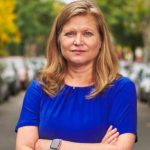
Kathryn Garcia
The key to our recovery is to provide the necessary support and day to day quality of life investments— clean parks, safe transit, reliable childcare, access to fresh healthy foods—that allow all New Yorkers to thrive. My Administration will prioritize supplying the most vulnerable New Yorkers with meaningful economic relief and pathways for economic mobility.
First, we will provide free childcare for working families, allowing guardians, especially women, to get back to work. Second, we will unlock barriers for small businesses by increasing access to credit, streamlining all laws and regulations governing restaurants and nightlife establishments, and cutting red tape for all permit and licensing processes. Third, we will create job pipelines into both the public and private sector for justice involved youth, CUNY colleges, and trade schools. We will guarantee graduates of our trade schools City employment, work with the private sector to offer 10,000 paid internships to high school students, and subsidize wages for youth who face barriers to employment. Lastly, for housing we will focus City investment where it’s needed most and create 50,000 units of deeply affordable housing (<30% AMI).
While it has been a dark year for New York City, that thing that makes us New York hasn’t gone away. The people who started those restaurants, theaters, salons, bodegas, dance clubs, gyms, and museums – all their creative talent is still here. They just need help. That’s why the core of our recovery plan is meaningful economic relief and job pathways for the most vulnerable New Yorkers. I have proposed a robust Reopen to Stay Open Plan that has three key focus areas:
- Create a single small business City Permit. Any new business with less than 100 employees will be able to fill out just one simple, streamlined permit to get up and running. You will be able to apply for that City Permit on your smartphone. Any new or returning business that applies for a City Permit will get a response within 1 month of submitting the application.
- Launch CrowdsourceNYC, a fund that provides zero interest microloans to small businesses with 20 employees or fewer, starting with anchor investments from the City’s pension fund and support from the private sector.
- Reimagine how the City uses public space to give local businesses and art organizations a bigger footprint in their communities–by reforming our concessions and public art permitting process to unlock hundreds of thousands of square feet of public space for arts and culture.
Read the Full Questionnaire
Kathryn Garcia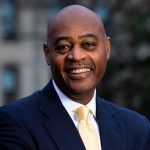 Ray McGuire
Ray McGuire
We will have to make smart investments to accelerate our city’s comeback. My economic recovery plan will allow the city to Go Big, Go Small, and Go Forward. I will Go Small through a Comeback Job Accelerator that will subsidize 50,000 jobs and a Comeback Bank that provides low-interest loans through CDFIs. My plan will give immediate financial support for struggling local businesses, and streamline permits, inspections, and approvals to help businesses open quickly. I will also create a menu of financial relief options that can be made available to small property owners in exchange for forgiving or lowering rent for small business tenants. I will Go Big by introducing a major infrastructure program that will create jobs rebuilding our roads and bridges, fixing subway elevators, building and renovating affordable housing, and making our city more sustainable. I will raise and invest $100 million a year to provide 15,000 New Yorkers with seats in bridge programs, which pair education with jobs training, and put these New Yorkers on the path to a good job. I will Go Forward by creating a $50 million loan fund targeted to small MWBEs and ensuring affordable childcare for all. I will institute a “shot clock” for the small business permitting process, requiring City agencies to complete reviews and inspections for most small businesses within 180 days.
Read the Full Questionnaire
Ray McGuire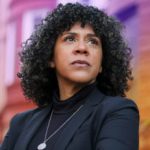 Dianne Morales
Dianne Morales
My vision for New York City’s recovery and economic development is premised on dignity, care, and solidarity. I believe we must shift away from the conventional model that only acknowledges value if there are private profits to be made. We must reimagine and rebuild the public imagination and our public institutions to rise to the challenge posed by climate change and hundreds of years of environmental injustices. Major investments in the Blue economy is critical to addressing both of these challenges. The harbor and maritime sector represent tremendous opportunities for public purpose and infrastructure that must be inclusive and participatory. A sustainable Blue economy in the 21st century must embrace the principles of qualitative growth, cooperation, adaptability and community well being.
When my administration hits the ground on January 1, 2022, my priorities for the first 100 days will be to focus on our Dignity Now platform to ensure that every New Yorker has the right to be valued and respected, not just through words but actions. This includes advocating for basic income relief for every household (and especially our excluded workers who were left out on the Federal & State level), advancing a local small business recovery strategy which includes grant support, immediate housing to end homlessness, the launch of NYC5000 which is a health navigators strategy to connect New Yorkers to COVID-19 education & testing & vaccines, and the creation of a municipal green jobs agenda by focusing on investing in lower carbon emissions in NYC and investing in thousands of jobs at the same time to combat climate change.
I will boost investment in our public services by reorienting our budget and priorities. Under my Administration, I will divest from the NYPD budget and invest in the community. This means removing police from schools and significantly reducing the militarized police headcount. I will prioritize funding for existing staff and eliminate contracts with external consultants. I will move away from corporate and real estate tax subsidies and instead invest those dollars in our communities and the workers that operate the City. Once I have recouped those dollars, I will
work with the newly elected State Senate Supermajority to remind the Governor that NYC generates the majority of the state’s revenue and ensure that the City gets its fair share of support from the state. Where NYC goes, so too does the state!
Read the Full Questionnaire
Dianne Morales Maya Wiley
Maya Wiley
We don’t just need a recovery, we need to reimagine what New York City looks like. COVID has not hit every community the same, and our plan needs to reflect that.
While some industries have partially recovered, people of color continue to suffer the worst, economically. As of September, Black and Latinx households had much higher rates of food and housing insecurity, and Asian households were experiencing considerable housing insecurity. Nearly a third of households with incomes below $50,000 were food and housing insecure. These examples make clear that while some in the city are doing okay, entire swaths of New York are struggling just to get by and are in danger of being forgotten.
This is why, as the first plank of my Economic Recovery Plan, I announced New Deal New York, a $10B capital investment program to put residents back to work and invest in the future of our communities. My plan will create a 5-year centrally managed $10B capital spending program for public works projects. The program will fund much-needed development, infrastructure repairs, and enhancements. The fund would consist of committed unspent capital funds and new capital dollars financed by City debt. It will also prioritize new kinds of investments that support our recovery while addressing the structural issues that cause racial and gender inequities. New Deal New York will target investments based on a comprehensive analysis of capital needs across five boroughs, using metrics including racial disparities in income, unemployment, capital need and city investment over the past decade, to ensure capital dollars are utilized in the most underinvested communities first. On Day One I will appoint a New Deal Czar who will report directly to me in City Hall and be responsible for implementing the program.
I have also put forward a plan for Universal Community Care — is an ambitious interagency plan that rebuilds economic growth in sectors dominated by women of color and ensures that these jobs are good jobs, addresses the crisis of affordable childcare and eldercare, and fights for fair wages and protections for workers in the care economy. Universal Community Care recognizes that care exists in many forms: from paid childcare and elder care to direct services provided by frontline nonprofit workers to care provided within the home by family, to neighbors helping neighbors. This model will redirect $300 million in diverted resources from incoming NYPD and DOCCS cadet classes to give 100,000 high need informal caregivers a $5,000 annual stipend to compensate them for their labor. Using the Universal Community Care Model, I will also build community centers providing free childcare, eldercare, and other services in each neighborhood. And it will create strong, meaningful worker protections for our city’s care workers.
Read the Full Questionnaire
Maya Wiley Andrew Yang
Andrew Yang
Through the pandemic, women and women of color in particular have had to bear the brunt of the crisis. From serving as the majority of our essential workers, to experiencing all of the net job loss through the employment crisis, to disproportionately bearing the burden of childcare and remote learning for children, to caring for loved ones who have fallen sick by COVID, women shouldered the pandemic and must be at the center of our recovery.
On day one of my campaign, I made a pledge to reopen 15,000 small businesses during my first year as mayor. Beyond this, we must reduce fines levied against such businesses. For instance, DCA already identifies some fines that can be curable. We will build on this by creating a multi-agency organization to support businesses and conduct educational inspections (including, but not limited to: DOB, FDNY, DCA, MOME, DOHMH, DEP) and shift from a focus on Multi-Agency (MARCH) Raids to a focus on CURE (Collaborative Uniform Repair Enforcement). A single stop will create much more ease for small businesses, especially women and minority-owned small businesses. This will be done in several languages so as to assist every entrepreneur and worker in the city.
In addition, NYC should have a consolidated app for many reasons, but one is to allow for crowdsourcing for NYC small businesses with matching donations. This could focus on co-ops, bars and restaurants, allowing them to keep themselves afloat until they’re free to fully open again. Londoners, for example, raised £1.5 million to support hundreds of businesses through a similar program, and there’s no reason NYC can’t do the same.
I am also committed to accelerating New York’s transformation into a green energy hub, which will produce thousands of good-paying jobs for New Yorkers. Already, I’ve supported the development of a geothermal power plant in Long Island City and a battery storage facility in Williamsburg, both of which would create jobs in neighborhoods devastated by the pandemic and move New York towards a clean energy economy.
Perhaps even more importantly, my public bank initiative – a People’s Bank – will be primed to give low-interest loans to small businesses that are often overlooked by international banks located in the City. The bank will be developed in a way that considers the neighborhood context so a good business idea is considered on merit, rather than on conventional assumptions.
Along with creating new jobs, reducing red tape for small businesses, stimulating the economy with my guaranteed income program and the People’s Bank of New York, I will also revive the City with the largest marketing campaign NYC has ever seen. Understanding that much of the vibrancy of NYC will come back once office spaces, theatres, restaurants and all small businesses reopen, I will be a partner in sustaining this vibrancy. We cannot divorce our economic rebound from other social issues, such as housing scarcity, poverty and homelessness. In order to facilitate this, I will increase public safety, reduce quality of life complaints, effectively pick up the garbage, and address the street homelessness crisis. As quality of life improves for everyone, New Yorkers and tourists alike will return to the city in droves, seeking the art, culture and energy that they have been missing for over a year and bolstering our small businesses and the economy at large.
Read the Full Questionnaire
Andrew Yang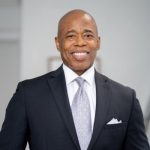
Eric Adams
To drive down unemployment and create good paying jobs, I will:
KEEP BUSINESSES OPEN AND EMPLOYEES WORKING WITH TAX RELIEF: Business owners are struggling to stay open as income for many stays low during the pandemic, forcing them to lay-off workers and close-up shop. To keep New Yorkers working—particularly in the service industries—we will allow businesses that pay the Commercial Rent Tax a break for two years if they demonstrate hardship and commit to certain employment levels.
ATTRACT NEW OUT-OF-TOWN BUSINESSES: The Relocation Employment Assistance Program (REAP) has successfully drawn new businesses here from outside the state by providing a tax credit per employee per year if they locate in certain areas of the city. We will expand that to bring more business to New York.
BE THE BACK OFFICE FOR OUR SMALL BUSINESSES: It is estimated that on average, small business owners spend 120 work days a year on all of the administrative tasks that come with owning a business. If the City offers “back office” assistance for these small businesses through local Chambers of Commerce, our mom and pop shops and entrepreneurs can save time and money on accounting and compliance needs, and focus on growing their businesses.
And finally, I would invest significant capital funds to create a local stimulus package that employees unemployed and underemployed New Yorkers to build infrastructure and housing, and fix our parks, our streets, and our schools so that we stay the greatest city in the world.
We can pay for this with savings from finding government inefficiencies and renegotiating contracts as well as with a “Recovery Share” for ultra-millionaires. We can generate $1-2 billion annually by instituting a modest increase to the income taxes of city earners who make more than $5 million a year, sunsetting after two years. Those funds would go directly into initiatives that help us bounce back from the pandemic, including testing and vaccination programs, anti-hunger efforts, and financial help for those New Yorkers and industries hardest hit by COVID-19. I have also proposed a Data Tax on Big Tech companies that sell New Yorkers personal information for profit.
Read the Full Questionnaire
Eric Adams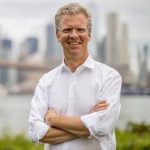
Shaun Donovan
The top priority for the next mayor must be the social, economic, and physical recovery of our city and its residents. The damage caused by COVID will be felt for years to come, and it will take considerable investment to not only return to what we had before, but to use this crisis to build back something better. To do this, we will need significant relief from the Federal government. My strong personal relationships with President Biden, Vice President Kamala Harris and members of Congress and the Senate puts me in a unique position to get the federal support that New Yorkers need and have been cruelly denied by the Trump administration. I will work to ensure we receive the necessary business and infrastructure aid, personal protective equipment, and other essentials as we rebuild and reimagine our economy as one that works for all New Yorkers.
The devastation wrought in 2020 by the COVID-19 pandemic and the national reckoning on race that followed the murders of George Floyd, Breonna Taylor, and others have only made it clearer that we cannot simply work toward a return to normal. We must hold ourselves and our economy to a much higher standard.
We need a city committed to using its power and resources to ensure a fair playing field for everyone; where everyone has a fair chance at a life of dignity; where everyone can earn a decent living, build a business, and test their talents and ambitions; and where businesses thrive—in every neighborhood and every borough.
We need a city committed to investing in neighborhoods and communities, and the small businesses and entrepreneurs that power them, and to driving job growth, stimulating entrepreneurship, sustaining the environment, and enhancing the quality of life of all New Yorkers. Every New Yorker should have the opportunity to live in a 15 minute neighborhood, where a great public school, fresh food, access to rapid transportation, a park, and a chance to get ahead can all be found within 15 minutes of their front door.
We need a city focused not only on the problems of today, but the opportunities of tomorrow: with Shaun’s plan, we will build the industries that will drive long-term growth and create good jobs for years to come.
In rebuilding our city, we need to start where job loss and economic decline have been most sharp and consequential. Our plan for New York’s economic recovery is anchored in six key principles of equitable development:
- Grow the economy to create opportunities for all New Yorkers
- Build a path for every New Yorker to develop skills that are directly tied to jobs
- Invest in neighborhoods, beginning with those that have endured the greatest disinvestment
- See, understand, and address racial inequalities explicitly, and measure progress
- Address inequalities head-on in partnership with community and business leaders
- Prioritize racial equity through strategic leadership and key appointments
Read more here.